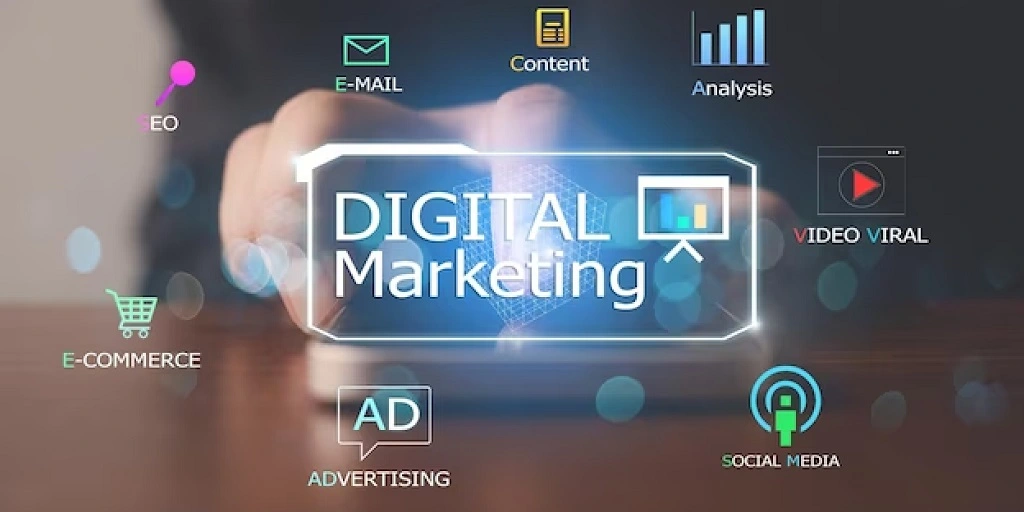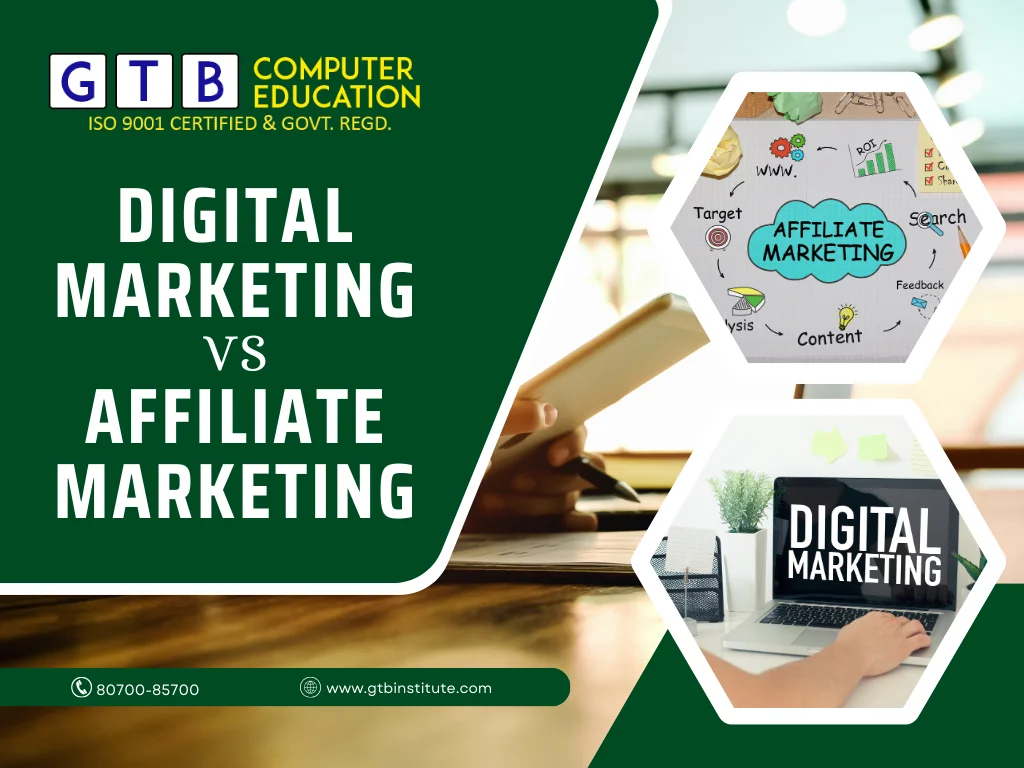In the ever-evolving landscape of online business, two powerful strategies have emerged as frontrunners: Digital Marketing vs Affiliate Marketing. Both of these methodologies have their own unique strengths, catering to the needs of diverse businesses and entrepreneurs. In this comprehensive guide, we delve deep into the world of Digital Marketing and Affiliate Marketing, comparing their merits, and drawbacks, and ultimately determining which one reigns supreme in the quest for online success.
Understanding Digital Marketing
Digital Marketing encompasses a wide array of strategies and techniques designed to promote products, services, or brands through various digital channels. These channels include search engines, social media platforms, email marketing, content marketing, and more. The overarching goal of Digital Marketing is to reach and engage a target audience, driving them towards desired actions such as making a purchase, signing up for a newsletter, or contacting the business.
The Power of Search Engine Optimization (SEO)
A cornerstone of Digital Marketing is Search Engine Optimization (SEO), which plays a pivotal role in enhancing a website’s visibility on search engine results pages (SERPs). SEO involves a meticulous set of practices that help websites rank higher organically, thus attracting more relevant traffic. Keyword research, on-page optimization, backlink building, and user-friendly content creation are some of the key components of successful SEO.

The Power of Pay Per Click (PPC)
In the ever-evolving digital marketing landscape, Google Ads has emerged as a dominant force, revolutionizing the way businesses connect with their target audience. Formerly known as Google AdWords, this powerful advertising platform allows businesses to reach potential customers precisely when they are actively searching for products or services, making it an indispensable tool for driving qualified leads and boosting conversions. In this section, we explore the unparalleled power of Google Ads and how it can catapult your business to new heights.
Harnessing the Potential of Social Media Marketing (SMM)
Another integral aspect of Digital Marketing is Social Media Marketing (SMM), where businesses leverage popular social platforms to connect with their audience and foster brand awareness. The ability to interact directly with consumers, share engaging content, and build a loyal following has propelled SMM into an indispensable marketing tool for businesses of all sizes.
The Role of Content Marketing
Content Marketing plays a vital role in establishing thought leadership and trust within an industry. By creating valuable, informative, and engaging content, businesses can position themselves as experts, attracting a steady stream of organic traffic. Blogs, articles, infographics, and videos are just some mediums employed in Content Marketing to captivate and retain audiences.
Note: Learn about the Benefits of Digital Marketing and the scope of digital marketing
Exploring the World of Affiliate Marketing
Affiliate Marketing, on the other hand, revolves around the collaboration between a merchant and affiliates (publishers) who promote the merchant’s products or services in exchange for a commission. It is essentially a performance-based marketing strategy, where affiliates are rewarded for driving desired actions, such as sales or leads, to the merchant’s website.
Unraveling the Affiliate Network
At the heart of Affiliate Marketing lies the affiliate network, which acts as an intermediary connecting merchants with potential affiliates. These networks provide a seamless platform where affiliates can find suitable products or services to promote, and merchants can tap into a pool of marketers to expand their reach.
The Advantages of Affiliate Marketing
One of the primary advantages of Affiliate Marketing is that it allows merchants to tap into a vast network of marketers without bearing the risk of upfront advertising costs. This performance-based model ensures that merchants only pay for actual results, making it a cost-effective option for businesses looking to grow their online presence.
The Role of Affiliate Content Creators
Affiliate Marketing thrives on the prowess of content creators, such as bloggers, YouTubers, and influencers, who possess the ability to sway their audience’s buying decisions. By creating compelling content that showcases the benefits of the merchant’s offerings, affiliate content creators can drive substantial traffic and conversions.

Digital Marketing vs. Affiliate Marketing
Now that we have explored the fundamental aspects of both Digital Marketing and Affiliate Marketing, let’s pit them against each other and examine which one might emerge victorious.
Cost-Effectiveness
In terms of cost-effectiveness, Affiliate Marketing often takes the lead. Merchants are only required to pay commissions when affiliates successfully drive the desired actions. This eliminates the risk of spending on campaigns that may not yield results, making Affiliate Marketing a budget-friendly choice for many businesses.
On the other hand, Digital Marketing may involve upfront costs for advertising, content creation, and other promotional activities. However, its long-term benefits, such as improved brand visibility and organic traffic growth, can prove immensely valuable in the grand scheme of things.
Control and Flexibility
In Digital Marketing, businesses have full control over their marketing efforts, content creation, and targeting strategies. This control allows for flexibility in adapting to changing market trends and customer preferences. On the contrary, Affiliate Marketing relies on the efforts of external affiliates, leading to a certain loss of control over the promotional content and strategies.
Reach and Audience Targeting
Digital Marketing excels in audience targeting capabilities, with tools like Google Ads and Facebook Ads offering granular targeting options. This enables businesses to reach their precise target audience based on demographics, interests, and online behavior. In Affiliate Marketing, the reach largely depends on the affiliates’ existing audience, which may or may not align perfectly with the merchant’s target demographic.
Trust and Credibility
Content creators in Affiliate Marketing can wield significant influence over their audience, leading to higher levels of trust and credibility for the promoted products or services. However, Digital Marketing, especially Content Marketing, also fosters trust by providing valuable information and insights, establishing a brand as an authoritative source in the industry.
Long-Term Sustainability
Digital Marketing’s long-term sustainability stems from building organic traffic through SEO and content efforts. Once a website gains a strong organic presence, it can continue to attract relevant traffic even without ongoing advertising spend. Affiliate Marketing, while lucrative for generating quick results, may be more susceptible to fluctuations based on affiliates’ promotional efforts.
Conclusion
In the battle of Digital Marketing vs. Affiliate Marketing, both strategies emerge as powerful tools, each possessing unique strengths and advantages. While Digital Marketing encompasses a wide range of techniques, including Search Engine Optimization (SEO), Social Media Marketing (SMM), and Content Marketing, Affiliate Marketing thrives on performance-driven collaboration with affiliates to promote products or services.
For more details about Digital Marketing and Affiliate Marketing
Visit our Website www.gtbinstitute.com
and also contact at +91-80700-85700
Touch us on Facebook, Instagram, Youtube, & Linkedin




